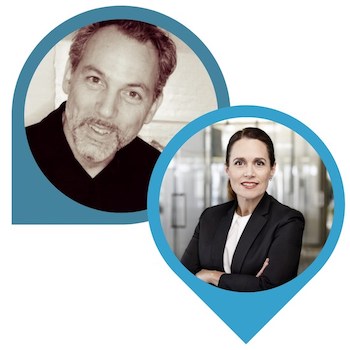Membership Engagement - Growing Tomorrow’s Leaders

Jeffer London speaks with Stefanie Stuhlsatz about the leaders of the future. Stefanie is a Vice President at Deutsche Post DHL Group (DPDHL), where she is responsible for Executive Leadership Programs. As their market shifted DPDHL leaders have had to transform their organisation to create a sustainable future. Jeffer London is a facilitator at the Center for Creative Leadership (CCL). CCL helps organisation worldwide, in both private and non-profit sectors, build their leadership capacity and make a true, sustainable difference.
Keeping people engaged is not always easy – it takes leadership. Whether you lead a team or an association, people want to know what the future holds. This is the story of a large organisation who has learned how to ensure a sustainable future – by focusing on developing leaders.
Jeffer London: How do you grow leaders?
 Stefanie Stuhlsatz: People are always developing themselves – it’s natural to grow. My job is to make leadership development into an explicit activity. Our senior people are all are great professionals – as economists, engineers or scientists, and they have an extended experience as leaders. Still leadership is not really trained, it is thrust upon us. With every challenge these leaders need to tackle, they continue to grow by moving out of their comfort zones again and again. At DPDHL, we offer them orientation by using the concept of whole leadership. It summarizes the approach of leading with head, heart and guts. As a leader development team, we facilitate situations that allow these leaders to sit back and reflect on their own self development and their leadership repertoire. We need to create moments where these reflections embrace individual’s situations, workplace challenges and the organisation’s goals.
Stefanie Stuhlsatz: People are always developing themselves – it’s natural to grow. My job is to make leadership development into an explicit activity. Our senior people are all are great professionals – as economists, engineers or scientists, and they have an extended experience as leaders. Still leadership is not really trained, it is thrust upon us. With every challenge these leaders need to tackle, they continue to grow by moving out of their comfort zones again and again. At DPDHL, we offer them orientation by using the concept of whole leadership. It summarizes the approach of leading with head, heart and guts. As a leader development team, we facilitate situations that allow these leaders to sit back and reflect on their own self development and their leadership repertoire. We need to create moments where these reflections embrace individual’s situations, workplace challenges and the organisation’s goals.
Jeffer: How do you get people to reflect on their leadership?
Stefanie: We get leaders thinking about how to adapt their knowledge, attitude and skills. Do I have the knowledge to take a good decision? Do I have the attitude that will engage people in the vision? Do I have the skills to make things happen? Leadership is an outcome of having all three aspects in place, without one of the three legs, the tripod is not stable. We design offers to cover most of this knowledge and skills and link them to whole leadership. As a leader you may experience different formats such as bite-sized and technology based learning as well as intense face to face workshops.
Developing a leadership attitude is a wider journey – we design offers for group reflections, personal stories and peer dialogue. When we shape a safe space for leaders to explore diverse perspectives, attitudes do shift. Not surprising, the stories they share, are not always about work – people’s leadership attitudes are shaped often by their life experiences – be it living in a different culture or creating a family.
Jeffer: Can you tell me more about the “safe space”?
Stefanie: Our intention is to have people take a deep dive into understanding their behaviours – so psychological safety is key. To open a room to conversation and heartfelt sharing, we need trust and openness. We invite people into an atmosphere that is apart from their usual workplace, to illuminate what is happening back at work. At the start of sessions, we ask groups to establish guidelines to allow for sharing – things like confidentiality, honesty, listening to learn, seeking to understand… this helps, but the real forum starts after the first person ventures to expose what is really happening for them personally.
Jeffer: How do people react to these structured reflections on leadership?
Stefanie: Individuals appreciate the opportunity – as they rise, they can often get isolated – these group processes allow them to stay connected, compare notes with peers, learn from each other, and shake up their minds. People see it as a meaningful aspect of their work-life. On a wider level, their leadership influences the engagement of the wider organisation. And this translates to impact: higher motivation, less absenteeism, greater retention – we get continuity and better results.
“We can only grow into what we can imagine. We need to stimulate leaders to see a future that is not a copy of the past.” – Stefanie Stuhlsatz commenting on Don Gilbert’s work on the psychology of your future self.
Jeffer: How is sustainable leader development important for your organization?
Stefanie: Business and development go hand in hand. Together, we are building the future. Bringing an organisation to the next level requires a different type of leader than the one who runs smooth operations. As a group dedicated to talent development, one of our challenges is ensuring that we have the leaders we will need in ten years, not just today – sustainability needs both continuity and reinvention. We need to be shaping the next generation of leaders, who represent the values and mind-set of the culture that is emerging.
Jeffer: How do you turn inspirational learning into long-term impact?
Stefanie: Our programmes are born from a close cooperation with the business; the strategic priorities are woven into the learning experiences – so sustained impact is implicit. Still, momentum can be a challenge. When possible, we offer coaches. Other times, we set up accountability partners or alumni groups. Ensuring people get an immediate result helps, as does nudges and reminders. The best is to ensure relevance – if you pick a top priority of the organisation, make it simple, and personally compelling – people will want to integrate the learning into their future.
Jeffer: What’s your advice for leaders developing the next generation of leaders?
Stefanie: Build on people’s strengths. Don’t try to fix them. Seek talented people and let them do what they are good at. If you find an incredible 100-meter sprinter, training them for marathons will only ruin their sprints. Look for leadership attitude and express your appreciation for what people do well.
Many thanks to Stefanie Stuhlsatz of Deutsche Post DHL Group (https://www.dpdhl.com) for taking a moment to speak with HQ about being a leader for their 550,000 employees spread over 220 countries. You can find more articles on Jeffer London’s blog (www.jeffer-london.com) and leadership resources the Center for Creative Leadership (www.ccl.org).
Other Articles
About Us
Supported by the Union of International Associations (UIA), the International Association of Professional Congress Organisers (IAPCO) and the Interel Group, the global public affairs and association management consultancy, Headquarters Magazines serve the needs of international associations organising worldwide congresses.














